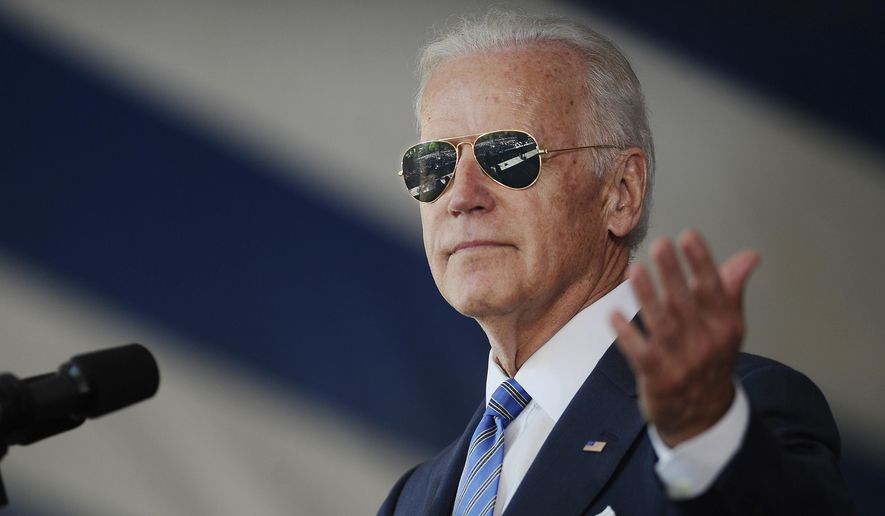A version of this story appeared in the On Background newsletter from The Washington Times. Click here to receive On Background delivered directly to your inbox each Friday.
Joseph R. Biden sent 82,000 pages of emails under three fake names during his time as vice president, according to records coughed up by the National Archives in response to a lawsuit.
The three fake names used on official White House emails are in addition to other aliases such as The Big Guy and Celtic that helped shield Mr. Biden’s identity during and after his time as vice president.
The fake names raise questions about Mr. Biden’s efforts to shield his communications from public disclosure and, in particular, the extent to which he involved his son Hunter Biden, who leveraged his father’s power in lucrative business deals.
Responding to a public records lawsuit filed by the conservative-leaning Southeastern Legal Foundation, the National Archives and Records Administration located “82,000 pages of potentially responsive White House documents” that included three aliases for the then-vice president: robineware456@gmail.com, JRBWare@gmail.com and Robert.L.Peters@pci.gov.
National Archives officials have not turned over the emails but are “currently processing” the documents and will produce “non-exempt portions” every month, they said in a preliminary report filed in U.S. District Court for the Northern District of Georgia.
The Southeastern Legal Foundation plans to litigate the case until the Archives fulfills its legal obligation to turn over the records, general counsel Kimberly S. Hermann said.
“The American public has a right to know what is in those emails,” Ms. Hermann told The Washington Times.
The Times reported in July that one White House scheduling email sent to Vice President Biden at the Robert.L.Peters@pci.gov address inexplicably looped in Hunter Biden.
The May 26, 2016, email alerted Mr. Biden and Hunter Biden to an upcoming call with Ukrainian President Petro Poroshenko. At the time, Hunter Biden was serving on the board of Ukrainian natural gas company Burisma Holdings, which was paying him $1 million a year to help the company stave off corruption probes, according to former business partners.
Mr. Biden later bragged that he helped push out Ukrainian Prosecutor General Viktor Shokin, who had seized the assets of Burisma owner Mykola Zlochevsky.
The House Oversight and Accountability Committee is also seeking Obama-era emails from the Archives that loop in Hunter Biden or use a pseudonym for Mr. Biden. So far, the Biden administration has blocked the committee from viewing all but 14 pages of documents, a Republican aide told The Times.
“This lack of transparency from the self-identified ‘most transparent administration in history’ is looking more like obstruction every day,” said House Oversight and Accountability Committee Chairman James Comer, Kentucky Republican. “Congress needs full access to these records and others as part of our investigation into Joe Biden and the Biden family’s corruption. The House Oversight Committee will continue to use the power of the gavel to obtain records necessary to our investigation.”
The National Archives says it must exclude from public release any personal records as defined by the Presidential Records Act and then must scrutinize each page to determine “if any sensitive information must be withheld from public release, including national security, law enforcement and personal privacy information.”
Former and incumbent presidents have up to 90 days to review information that the National Archives plans to release to the public to determine whether any should be withheld as privileged.
Mr. Biden’s use of aliases while serving as vice president was first discovered on the laptop computer discarded by Hunter Biden. It was also disclosed through public information requests sent to the National Archives, the custodian of emails and other White House records after an administration ends.
In addition to the three email addresses released by the National Archives, business associates of Hunter Biden identified Mr. Biden as “Celtic” and “The Big Guy,” according to messages discovered on the discarded laptop computer and messages that former business partner Tony Bobulinski provided.
In one text message sent on May 20, 2017, five months after Mr. Biden left the Obama White House, a business associate named James Gilliar messaged Mr. Bobulinski to warn him, “Don’t mention Joe being involved, it’s only when u are face to face. I know u know that but they are paranoid.”
Mr. Bobulinski responded: “Ok they should be paranoid about things.”
• Susan Ferrechio can be reached at sferrechio@washingtontimes.com.




Please read our comment policy before commenting.